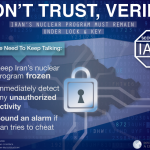After weeks of speculation, it’s finally been confirmed: President Obama will make a visit to Hiroshima after the G-7 Summit later this month.
Obama
Looking Beyond New START to the Future of U.S.-Russian Arms Control Treaties
On October 1,, 2015 the U.S Department of State’s Bureau for Arms Control, Verification and Compliance released its count of U.S. and Russian strategic nuclear weapons covered under the New START treaty. For the first time since the treaty entered into force on February 5, 2011, the United States has dropped below the imposed limit on deployed strategic warheads.
Six Years Post-Prague
Rose Gottemoeller Announces New Disarmament Verification Initiative
In a speech at the Prague Agenda 2014 Conference yesterday, Undersecretary for Arms Control and International Security Rose Gottemoeller announced a new “International Partnership for Nuclear Disarmament Verification” initiative. The project will be a collaborative multi-national effort spearheaded by the U.S. government and the Nuclear Threat Initiative (NTI). According to Gottemoeller, the initiative will bring together “both nuclear weapon states and non-nuclear weapons states to better understand the technical problems of verifying nuclear disarmament, and to develop solutions.”
The project will build on the Innovating Verification: New Tools & New Actors to Reduce Nuclear Risk report series published in July 2014 by NTI, which outlines a framework for their Verification Pilot Project. NTI, founded by Ted Turner and former U.S. Senator Sam Nunn, is a collaborative private-public sector partnership that aims to reduce the global threat of weapons of mass destruction.
This announcement comes just days before the United States is scheduled to attend the Vienna Conference on the Humanitarian Impact of Nuclear Weapons, December 8-9.
The State Department’s decision to attend this year is significant considering the U.S. declined to attend the last two conferences in March 2013 and February 2014. This new initiative, as well as the decision to attend next week’s conference in Vienna, demonstrates Obama’s continued commitment to nuclear safety and disarmament; however, it does not suggest a change in U.S. nuclear policy.
“We are participating [in the conference] to reinforce the messages I have put forth here – that the practical path we have followed so successfully in the past remains the only realistic route to our shared goal of a nuclear weapons- free world. We cannot and will not support efforts to move to an amorphous nuclear weapons convention or the false hope of fixed timeline for the elimination of all nuclear weapons,” said Gottemoeller.
Throughout her speech, Gottemoeller reinforced the United States’ commitment to a safe, secure and effective nuclear arsenal that is not mutually exclusive with U.S. disarmament goals.
Five years ago, during his historic 2009 Prague speech on nuclear weapons, President Obama said:
“Just as we stood for freedom in the 20th century, we must stand together for the right of people everywhere to live free from fear in the 21st century. (Applause.) And as nuclear power — as a nuclear power, as the only nuclear power to have used a nuclear weapon, the United States has a moral responsibility to act. We cannot succeed in this endeavor alone, but we can lead it, we can start it.”
Obama has made strides towards this commitment to reduce the threat of nuclear weapons and nuclear terrorism since he stepped into the White House. Since his 2009 speech, “over 3 metric tons of vulnerable HEU and plutonium material have been removed or disposed of, and 11 countries have removed all HEU from their territory,” and the P5+1 are on the brink of a historic deal with Iran on their nuclear program.
But the President has more to do in order to ensure he leaves an impressive legacy on increasing nuclear security and reducing the role of these weapons in our national security strategy.
Obama’s State of the Union: Give Diplomacy a Chance
Last Tuesday night, when President Obama delivered his State of Union address to Congress, he made it clear that his focus for the coming year and his second term would be to “give diplomacy a chance.” Diplomacy, he emphasized, is the best solution to our current conflicts; military might alone cannot get the job done.


